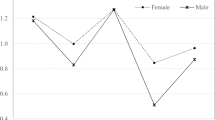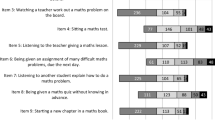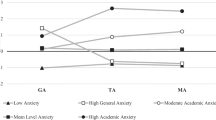Abstract
In order to test the assumption that mathematically talented students show little mathematics anxiety, students participating in an early entrance to college program for talented students were asked to complete the Mathematics Anxiety Rating Scale. Results indicated that these talented students were less math anxious than most unselected college students. However, they were more math anxious than a group of college students majoring in physics. Females in the study showed a tendency to be more math anxious than males (d=−.32), although this finding was not significant. No relationship between level of mathematics anxiety and grades or math anxiety and Scholastic Aptitude Test — Mathematics scores was found for the group of subjects. However, when those relationships were examined for males alone, higher verbal scores and higher grades were associated with lower levels of mathematics anxiety. These relationships were not evident for females.
Similar content being viewed by others
References
Benbow, C. P. (1987). Factors associated with high achievement in mathematics and science among mathematically talented students: A longitudinal study. Paper presented at the annual meeting of the American Educational Research Association, Washington, DC.
Benbow, C. P. (1988). Sex differences in mathematical reasoning ability in intellectually talented preadolescents: Their nature, effects, and possible causes.Behav. Brain Sci. 11: 169–232.
Betz, N. E. (1978). Prevalence, distribution, and correlates of mathematics anxiety in college students.J. Counsel. Psychol. 25: 441–448.
Brush, L. R. (1978). A validation study of the Mathematics Anxiety Rating Scale (MARS).Educat. Psychol. Measure. 38: 485–490.
Brush, L. R. (1980).Encouraging Girls in Mathematics: The Problem and the Solution. Abt Books. Cambridge, MA.
Cohen, J. (1977).Statistical Power for the Behavioral Sciences. Academic Press, New York.
Dew, K. M., Galassi, J. P., & Galassi, M. D. (1984). Math anxiety: Relation with situational test anxiety, performance, physiological arousal, and math avoidance behavior.J. Counsel. Psychol. 31: 580–583.
Dutton, W. H. (1956). Attitudes of junior high school pupils toward arithmetic.School Rev. 64: 18–22.
Fennema, E., & Sherman, J. (1976). Fennema-Sherman Mathematics Attitude Scales: Instruments designed to measure attitudes toward the learning of mathematics by females and males.JSAS Cat. Select. Doc. Psychol. 6: 31 (MS. 1225).
Fox, L. H., Brody, L., & Tobin, D. (1982).The study of social processes that inhibit or enhance the development of competence and interest in mathematics among highly able young women. Report to the National Institute of Education (ERIC Document Reproduction Service No. ED 222 037).
Fox, L. H., Brody, L. E., & Tobin, D. (1985). The impact of early intervention programs upon course-taking and attitudes in high school. In Chipman, S. F., Brush, L. R., & Wilson, D. M. (eds.),Women and Mathematics: Balancing the Equation. Erlbaum, Hillsdale, NJ.
Llabre, M. M., & Suarez, E. (1985). Predicting math anxiety and course performance in college women and men.J. Counsel. Psychol. 32: 283–287.
Pedro, J. D., Wolleat, P., Fennema, E., & Becker, A. D. (1981). Election of high school mathematics by females and males: Attributions and attitudes.Am. Educat. Res. J. 18, 207–218.
Resnick, H., Viehe, J., & Segal, S. (1982). Is math anxiety a local phenomenon? A study of prevalence and dimensionality.J. Counsel. Psychol. 29: 39–47.
Richardson, F. C., & Suinn, R. M. (1972). The Mathematics Anxiety Rating Scale: Psychometric Data.J. Counsel. Psychol. 19: 551–554.
Richardson, F., & Woolfolk, R. (1980). Mathematics anxiety. In I. G. Sarason, I. G. (ed.),Test Anxiety: Theory, Research, and Application. Erlbaum, Hillsdale, NJ.
Suinn, R. M. (1988a).Mathematics Anxiety Rating Scale: Informational Brief. RMBSI, Fort Collins, CO.
Suinn, R. M. (1988b).Mathematics Anxiety Rating Scale (MARS). Rocky Mountain Behavioral Science Institute, Fort Collins, CO.
Suinn, R. M. (1988c).Mathematics Anxiety Rating Scale (MARS): Information for users. RMBSI, Fort Collins, CO.
Suinn, R. M., Edie, C. A., Nicoletti, J., & Spinelli, P. R. (1972). The MARS, a measure of mathematics anxiety: Psychometric data.J. Clin. Psychol. 28: 373–375.
Tobias, S. (1978).Overcoming Math Anxiety. Houghton Mifflin, Boston.
Tobias, S., & Weissbrod, C. (1980). Anxiety and mathematics: An update.Harvard Educat. Rev. 50: 63–70.
Author information
Authors and Affiliations
Additional information
Received Ph.D. in educational psychology from Texas A&M University, and was Postdoctoral Fellow with the Study of Mathematically Precocious Youth at Johns Hopkins University. Research interests include studying characteristics of mathematically talented students and developing appropriate programs for them.
Ph.D. in educational psychology from Southern Illinois University. Research interests include measurement and evaluation.
Rights and permissions
About this article
Cite this article
Lupkowski, A.E., Schumacker, R.E. Mathematics anxiety among talented students. J Youth Adolescence 20, 563–572 (1991). https://doi.org/10.1007/BF01537362
Received:
Accepted:
Issue Date:
DOI: https://doi.org/10.1007/BF01537362




